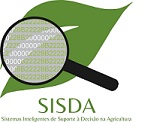Supply chains have required technology that enhances their coordination capacity, aiming to increase their performance and competitiveness. Reducing food waste and loss is a goal of the UN Agenda 2030. The integration of these two global demands has motivated studies that propose technological solutions that improve the management of agro-food chains. With the focus on the agro-food chains that generate the most losses - horticultural chains -, the objective of this project is to carry out the necessary studies to create a support system for tactical-level decisions related to horticultural production planning based on demand and losses forecasting. The study will involve the agents (production and retail) of two short lettuce chains - one in Brazil and the other in Chile -, which will provide context and empirical data and condition the choice of business model appropriate to the two countries. The execution of the project is divided into three sequenced steps: food losses study, data mining studies and optimization study. Sales data and its causal factors will be provided by retail; losses data and their causal factors will be provided by the study of on it. Both data and their causal factors will constitute a database in which mining techniques will be applied, in order to identify relationships and quantify them. Finally, relationships and parameters identified in the previous step will support the modeling of lettuce production planning, in which optimization techniques will be applied to support the decision of when and how much to plant. The results of the project can be integrated to platforms of negotiation between production and retail, providing economic gains to the chain and its agents and environmental gains with the reduction of losses.
- Hits: 2921






